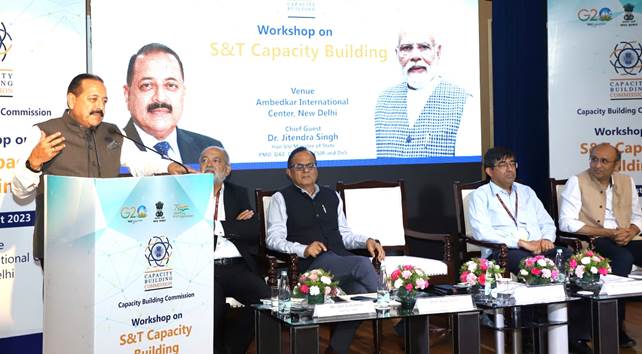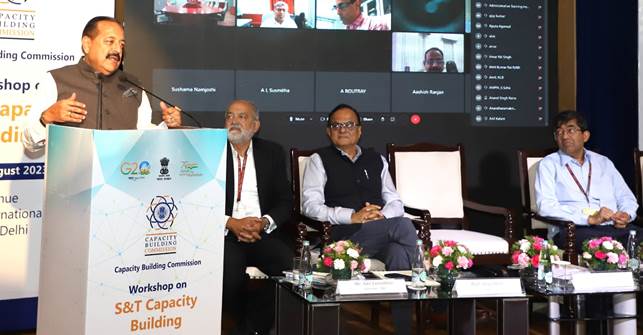Ministry of Science & Technology
Anusandhan National Research Foundation (ANRF), passed by the Parliament last week, aims at equitable funding and democratisation of resources in research and academics, says Union Minister Dr Jitendra Singh
Dr Jitendra Singh calls for assimilation of more and more Private Research Foundations with Government Scientific Departments for technology-led development of India
The Minister says, Anusandhan National Research Foundation is aimed at equitable funding of scientific research and for bringing in greater private participation
Speaking at a workshop on Capacity Building for Science and Technology in New Delhi, Dr Jitendra Singh stressed on meaning exchange of ideas between public and private labs for building a tech-led prosperous India
Posted On:
18 AUG 2023 5:15PM by PIB Delhi
"Anusandhan National Research Foundation" (ANRF), passed by the Parliament last week, aims at equitable funding and democratisation of resources in research and academics.
This was stated by the Union Minister of State (Independent Charge) Science & Technology; MoS PMO, Personnel, Public Grievances, Pensions, Atomic Energy and Space, Dr Jitendra Singh, while delivering the keynote address at a workshop on Capacity Building for Science and Technology, in New Delhi.

Dr Jitendra Singh called for more and more Private Research Foundations to be assimilated with Government Scientific Departments for technology-led development of India. He called for equitable funding of scientific research and bringing in greater private participation.

The Minister emphasised that the ANRF, envisaged by the Prime Minister Shri Narendra Modi will catapult India to the league of developed nations pioneering new research in new frontiers.
Dr Jitendra Singh said, ANRF will have to nudge companies to invest in R&D. He added that the Government is planning a unique Public Private Partnership (PPP) entity for which ₹36,000 Cr of the research funding is to come from the private sector, mostly industry whereas Government will put ₹14,000 Cr for the same, to ensure greater participation of industry.
Dr Jitendra Singh said, the pace of change is so rapid that India can’t afford to wait any longer and the time has come to end the demarcation of Public and Private entities. He called for meaningful exchange of ideas between public and private labs for building a tech-led prosperous India.
Dr Jitendra Singh said, scientists should adopt team driven approach for problem solving and product development rather than individual approach towards research.

Dr Jitendra Singh expressed happiness that all the heads of the Scientific Department attended the Capacity Building meeting along with a large number of scientists joining online. The Minister exhorted the scientific community to pick up good things and best practices of the Corporate Sector. He also underlined that a threshold of absorption of capacity building must be defined.
Dr Jitendra Singh informed that India is now launching cutting-edge technological breakthroughs in tandem with the Developed countries of the world and gave the example of the National Quantum Mission (NQM) and international laurels in the Space sector.
The Minister said, investments in AI and quantum technology would lead to transformative advances in our everyday lives and greatly benefit our social well-being by impacting healthcare, agriculture, climate change and more. He welcomed the transformative potential of the Endowment fund.

Shri Adil Zainulbhai, Chairman, Capacity Building Commission, Prof, Ajay Sood, Principal Scientific Advisor to Government of India, Dr Rajesh Gokhale, Secretary, DST & Secretary, DBT Shri Praveen Pardeshi, Member (Admin), CBC and many senior scientists and officials took part in the workshop.
About CBC
The Capacity Building Commission (CBC) has been set up to provide a strategic framework for capacity building of the ministries and departments. This strategic framework came out to be as Annual Capacity Building Plan (ACBP), which brings out the identified competencies in a calendarized format. The government has put in place a number of initiatives to support the mission, including:
- A competency-based framework for capacity building
- An online learning platform
- A performance management system
- A culture of continuous learning
Scientific capacity building is essential for the advancement of knowledge across various fields. By investing in research infrastructure, training, and education, India can contribute significantly to global scientific progress. A strong scientific workforce can drive the creation of new technologies, products and solutions that address local and global challenges. The country’s, whose economy is developing rapidly, building scientific capacity can fuel economic growth ever further, and a thriving scientific ecosystem fosters economic growth and job creation. Research and innovation lead to the development of new industries, startups, and businesses, which in turn generate employment opportunities.
Capacity Building for S&T can create a pipeline of skilled researchers, scientists, and professionals who can enable India to engage more effectively in international collaborations as Collaborative research efforts can lead to shared knowledge, cultural exchange, and collective solutions to global problems. Addressing environmental challenges, such as climate change, pollution, and resource depletion, requires scientific expertise. A skilled workforce can contribute to the development of sustainable practices and clean technologies. Focusing on functional competencies policies for S&T, Scientists can provide policymakers with accurate and reliable information to guide decisions on issues ranging from public health to technology regulation. Scientific capacity building contributes to national resilience and preparedness, as we all experienced with Covid-19. Capacity Building for R&D is essential in dealing with natural disasters, pandemics, and other unforeseen challenges. Building scientific capacity encourages interdisciplinary research, where experts from different fields collaborate to solve complex problems. This approach leads to holistic and comprehensive solutions, this also calls for interdisciplinary knowledge sharing between our own S&T departments as well.
Developing a skilled scientific workforce is crucial for achieving technological sovereignty, reducing dependency on foreign technologies, and ensuring self-reliance in critical sectors. A strong scientific workforce is not only necessary for India's progress and development but is also a driving force behind innovation, economic growth, sustainable practices, and global leadership. Investing in scientific education, research, and capacity building is an investment in the future of the nation. We are in the midst of a technology revolution and we as a nation must make best use of this transformation to deliver good governance for our citizens. A sound structure encapsulating scientific research and development is needed to stay abreast with the fast-paced science ecosystem.
<><><><><>
SNC/PK
(Release ID: 1950145)
Visitor Counter : 4560